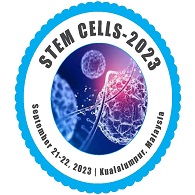Senescence Cells
Cellular Senescence refers senescence growth arrest enforces the idea that the senescence response evolved a minimum of partially to suppress the event of cancer. The senescence arrest is taken into consideration irreversible as results of no noted physiological stimuli can stimulate recent cells to enter the cell cycle. Senescence cell response is accepted as a potent growth restrictive mechanism. However, recent proof strengthens the idea that it jointly drives chronic pathologically, presumptively by promoting chronic inflammation. Thus, the senescence response is additionally the results of antagonistically pleiotropic sequence action
- Cellular Senescence
Related Conference of Senescence Cells
March 09-10, 2026
21th World Congress on Tissue Engineering Regenerative Medicine and Stem Cell Research
Singapore City, Singapore
June 18-19, 2026
16th International Conference on Human Genetics and Genetic Diseases
Singapore City, Singapore
June 18-19, 2026
19th International Conference on Genomics & Pharmacogenomics
Singapore City, Singapore
Senescence Cells Conference Speakers
Recommended Sessions
- Adult Stem Cells
- Bio Materials and Tissue Engineering
- Cancer Stem Cells
- Embryonic Stem Cells
- Hemapoetic Stem Cells
- Induced Pluripotent Stem Cells
- Lipogems
- Regenerative Medicine
- Scaffolds
- Senescence Cells
- Stem Cell Biology
- Stem Cell Biotechnology
- Stem Cell Niche
- Stem Cell Technologies
- Stem Cell Therapy
- Stem Cell Transplantation
- Tissue Preservation and Bio Banking
Related Journals
Are you interested in
- 3D Bioprinting, Organ Fabrication & Bioartificial Tissues - Stem Cell 2026 (Netherlands)
- Aging Biology, Longevity Science & Cellular Rejuvenation - Stem Cell 2026 (Netherlands)
- Artificial Intelligence and Computational Biology in Regenerative Medicine - Stemgen 2026 (Japan)
- Bioinformatics, AI Models & Predictive Regeneration - Stem Cell 2026 (Netherlands)
- Biomaterials and Nanotechnology in Regenerative Medicine - Stemgen 2026 (Japan)
- Cancer Stem Cells & Targeted Therapeutics - Stem Cell 2026 (Netherlands)
- Cancer Stem Cells and Oncology - Stemgen 2026 (Japan)
- Cardiac, Vascular & Musculoskeletal Regeneration - Stem Cell 2026 (Netherlands)
- Cardiovascular Regeneration - Stemgen 2026 (Japan)
- Clinical Translation of Stem Cell Therapies - Stem Cell 2026 (Netherlands)
- Clinical Trials and Translational Stem Cell Research - Stemgen 2026 (Japan)
- Commercialization, Biobanking & Industry Innovations - Stem Cell 2026 (Netherlands)
- Ethical, Legal, and Social Implications in Stem Cell Research - Stemgen 2026 (Japan)
- Ethical, Regulatory & Quality Control Frameworks - Stem Cell 2026 (Netherlands)
- Exosomes, Extracellular Vesicles & Cell-Free Therapeutics - Stem Cell 2026 (Netherlands)
- Future Trends: Organoids, Bioengineering, and Next-Generation Therapies - Stemgen 2026 (Japan)
- Gene Editing and CRISPR Technologies - Stemgen 2026 (Japan)
- Gene Editing, CRISPR Therapies & Regenerative Genomics - Stem Cell 2026 (Netherlands)
- Induced Pluripotent Stem Cells (iPSCs) and Reprogramming - Stemgen 2026 (Japan)
- Mesenchymal Stem Cells (MSCs) in Therapy - Stemgen 2026 (Japan)
- Regeneration in Neurodegenerative & Spinal Cord Disorders - Stem Cell 2026 (Netherlands)
- Regenerative Approaches in Diabetes & Metabolic Disorders - Stem Cell 2026 (Netherlands)
- Regenerative Dentistry and Craniofacial Applications - Stemgen 2026 (Japan)
- Regenerative Immunology & Immune Modulation - Stem Cell 2026 (Netherlands)
- Regenerative Medicine and Tissue Engineering - Stemgen 2026 (Japan)
- Stem Cell Banking and Cryopreservation - Stemgen 2026 (Japan)
- Stem Cell Biology and Cellular Mechanisms - Stemgen 2026 (Japan)
- Stem Cell Engineering & Cellular Reprogramming - Stem Cell 2026 (Netherlands)
- Stem Cells in Neurological and Neurodegenerative Disorders - Stemgen 2026 (Japan)
- Tissue Engineering, Biomaterials & Smart Scaffolds - Stem Cell 2026 (Netherlands)

